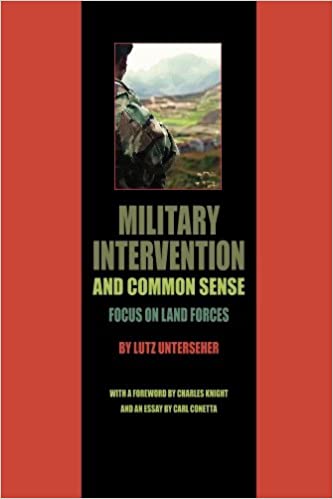➪ HTML by Charles Knight, Huffington Post, 07 May 2013. Advocates for U.S. military intervention in Syria are presently confounded by wide and deep opposition from the American public to additional military interventions abroad. When strong majorities hold opinions opposing military intervention in Syria there is something other than isolationism going on. Indeed, a majority of Americans are far ahead of Washington in learning the hard lessons of the Iraq and Afghanistan wars.
U.N. & Peace Operations
Military Intervention and Common Sense: Focus on Land Forces
by Lutz Unterseher, Berlin-Greifswald: Ryckschau, 2008. Foreward by Charles Knight. Includes a chapter by Carl Conetta, Helicopters in the US wars since 9/11. PDF | order paperback
[from the Foreward]
“This book…makes a major contribution to undoing the confusion for one class of increasingly likely 21st Century uses of military force. That is, internationally sanctioned military intervention using greater force than traditional peace-keeping and less than ‘war-fighting’.”
Security in the Great Transition
by Charles Knight, Tellus Institute Great Transition Initiative Series, 2006. PDF
This essay seeks to offer a plausible narrative of how the world moves very close to the elimination of large-scale organized violence over the course of this century.
“This narrative is written with the voice of a grateful historian in 2084. Whatever reality emerges [over the coming decades] will not be constructed out of human imagination and agency alone. Much is beyond our control. But as humans we have some freedom to apply our labor and skills with spirit and purpose toward goals. The first step on this path of purpose is in the imagination.”
What Justifies Military Intervention?
(HTML version) commentary by Charles Knight, 27 September 2001. Examines the problems for international security associated with U.S. military intervention abroad. Includes a Postscript on the “war on terrorism” (revised 01 March 2002) and Selected Readings on the doctrines of Just War, Total War, and Strategic Bombing (revised 01 March 2002).
Interventionism Reconsidered: Reconciling Military Action With Political Stability
(HTML version) by Lutz Unterseher, September 1999. When troops trained, structured, and equipped for traditional peacekeeping are employed in missions such as the protection of humanitarian sanctuaries and convoys under acute threat they are not prepared for forceful measures sufficient to deal with and discourage military challenges. This paper discusses what would constitute “adequacy” of force that does not have a character or magnitude that compromises the primacy of political conflict resolution. A revised version of a paper was contributed to a 1999 workshop held at the University of Melbourne’s Centre for Philosophy and Public Issues on the topic, The Ethics of Armed Intervention.
Design for a 15,000-person UN Legion
(HTML version) by Carl Conetta and Charles Knight, Briefing Report 8, October 1995. Prepared for members of the UN Military Force Study Group of the American Academy of Arts and Sciences, this report presents a design for a streamlined UN Legion capable of deploying rapidly for a wide range of peace operations. It addresses operational requirements, command and unit structure, equipment, basing, and budget. It is published as Appendix: Design for a Streamlined UN Legion in Carl Kaysen and George Rathjens, Peace Operations by the United Nations: The Case for a Volunteer UN Military Force, Committee on International Security Studies, American Academy of Arts and Sciences, Cambridge, MA, USA, 1996.
Vital Force: A Proposal for the Overhaul of the UN Peace Operations System and for the Creation of a UN Legion
by Carl Conetta and Charles Knight, PDA Research Monograph #4, October 1995. 141 pp. 11 figures. 13 tables.
➪ PDF
Reviews the problems of contemporary peace operations, recent reform proposals, and the requirements for successful operations. Includes a detailed proposal for enhancing and reorganizing the capacities of the UN to support and direct peace operations and for establishing a UN legion of three brigades.
Selections from Vital Force are also available in HTML format:
- Executive Summary, Table of Contents, and Preface;
- Review of Selected UN Staff Reform Proposals;
- The Logic of Peace Operations: Implications for the Force Design; which examines the differences between conventional warfare and peace operations and derives a logic for distinguishing the particular military requirements of peace, operations.

